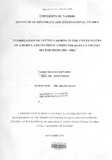| dc.contributor.author | Mwangi kinyoho, Njeri | |
| dc.date.accessioned | 2013-05-07T12:11:04Z | |
| dc.date.available | 2013-05-07T12:11:04Z | |
| dc.date.issued | 2006 | |
| dc.identifier.uri | http://erepository.uonbi.ac.ke:8080/xmlui/handle/123456789/19834 | |
| dc.description.abstract | Agriculture still remains the key sector in African economies as it contributes significantly to
their growth. A large proportion of agricultural produce from these countries is meant for the
export market but shifts in local, regional and international policies have resulted in declining
performance of this sector especially cotton. Implementation of biased policies by developed
countries in particular United States of America, has resulted in limited access to the world
cotton market by developing countries, Kenya included. These policies in particular
subsidization of the US cotton industry have resulted in a fall of cotton prices at the world
market. The neo-liberalism theory assists the study in deducing the reasons behind unfair
competition in cotton trade. While the theory advocates for free trade, this was not the case in the
cotton industry as the American government continued to be actively involved in its cotton
industry by classifying its subsidies to be within the World Trade Organization (WTO) allowed
standards of support. This continued to aggravate the inequalities between the cotton producing
countries.
This project notes that the Kenyan government had implemented different programs to revive the
sector at the local level. At the international level, the government in liaison with other
developing countries is lobbying at the WTO for developed countries to reduce their subsidies. It
is anticipated that this will improve developing countries access to the world market. As a result,
such initiatives would significantly revive the cotton sector to enjoy its comparative advantage
and enable it contribute as expected to the country's economy.
From the project findings, it is recommended that the Kenyan government undertakes a
significant role in the cotton sector. This will be through provision of incentives, implementation
of limited subsidization policies, infrastructure development and establishment of an apex
institution to supervise the sector. Chaitges in terms of government policies also need to be
analyzed before implementation to reduce the negative impacts resulting from rush or poor
implementation. Lobbying at the WTO would also play a significant role in the revitalization of
the industry. This would increase the access of Kenyan cotton at the world market. | en |
| dc.description.sponsorship | The University of Nairobi | en |
| dc.language.iso | en | en |
| dc.subject | subsidization of cotton farming in the united states | en |
| dc.subject | Kenya's cotton | en |
| dc.title | Subsidization of cotton farming in the united states | en |
| dc.type | Thesis | en |
| local.publisher | Institute of diplomacy and international studies | en |

